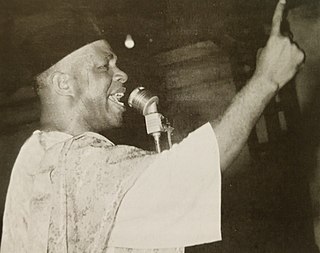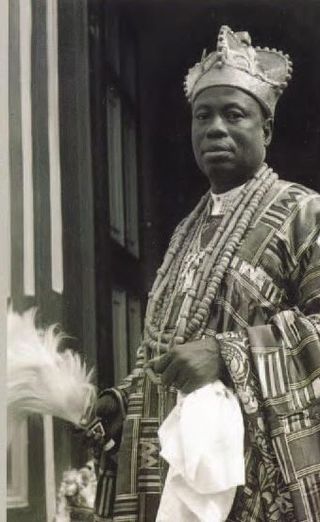
Nnamdi Benjamin Azikiwe, PC, usually referred to as "Zik", was a Nigerian statesman and political leader who served as the first president of Nigeria during the First Nigerian Republic which existed from 1963 to 1966. Considered a central figure and a driving force behind the nation's independence, he came to be known as the "father of Nigerian nationalism".

Sir Abubakar Tafawa Balewa was a Nigerian politician who served as the first and only prime minister of Nigeria upon independence. A conservative Anglophile, he favoured maintaining close ties with the British. During his first few years in office as prime minister, Nigeria was a constitutional monarchy with Elizabeth II reigning as Queen of Nigeria, until Nigeria became a republic in 1963. He was both a defender of Northern special interests and an advocate of Nigerian reform and unity.
The National Council of Nigeria and the Cameroons (NCNC) later changed to the National Convention of Nigerian Citizens, was a Nigerian nationalist political party from 1944 to 1966, during the period leading up to independence and immediately following independence.
Arondizuogu (Aro-ndizuogu) is a town inhabited by the Igbo subgroup of the Aro people in Imo State of Nigeria. The Arondizuogu community is believed to have migrated from Arochukwu in the present Abia State to their current settlements in Imo state, which include the Okigwe, Ideato North and Onuimo local governments. However, others of Aro descent are in other local governments in Imo State.

Gbadamosi Adegoke Adelabu was a prominent personality in the politics of Ibadan city and subsequently that of the Western Region of Nigeria right before the country's independence in 1960. He was Nigeria's Minister of Natural Resources and Social Services from January 1955 to January 1956 and was later the opposition leader in the Western Regional Assembly until his death in 1958. He was a self-made man born into a humble family but became an influential figure in Nigerian politics. He attended Government College, Ibadan and eventually became a businessman. His successful political career was cut short when he was killed in a car crash, not long before Nigeria gained independence from Britain.

Kingsley Ozumba Mbadiwe (1915–1990) was a Nigerian nationalist, politician, statesman, and government minister in the Nigerian First Republic and a Biafran Roving ambassador during the civil war.

Chief Festus Okotie-Eboh was a Nigerian politician who was the finance minister of Nigeria from 1957 to 1966 during the administration of Sir Abubakar Tafawa Balewa.
Sir Louis Phillip Odumegwu Ojukwu, OBE was a Nigerian business tycoon from the Ojukwu family of Nwakanwa quarters Obiuno Umudim Nnewi.
Eyo Ita (1903–1972) was a Nigerian educationist and politician from Creek Town, in present-day Cross River State, who was the leader of the Eastern Government of Nigeria in 1951 and the first Professor Nigeria ever had. He was one of the earliest Nigerian students who studied in the United States instead of the frequent route of studying in the United Kingdom. He was a deputy national president of the National Council of Nigeria and the Cameroons (NCNC) in the late 1940s and early 1950s.
Hezekiah Oladipo Davies, Q.C. was a leading Nigerian nationalist, founding father, lawyer, journalist, trade unionist, thought leader and politician during the nation's movement towards independence in 1960 and immediately afterwards.

Babatunji Olowofoyeku, OFR, SAN, was a Nigerian politician, educationist, lawyer and leader, a Yoruba and native of Ilesha in Osun State of Nigeria, whose political career started in the mid-1950s.
Kofoworola Adekunle "Kofo" Abayomi was a Nigerian ophthalmologist and politician. He was one of the founders of the nationalist Nigerian Youth Movement in 1934 and went on to have a distinguished public service career. His last major public assignment was as chairman of the Lagos Executive Development Board from 1958 until 1966.

Nigerian nationalism asserts that Nigerians as a nation should promote the cultural unity of Nigerians. Nigerian nationalism is territorial nationalism and emphasizes a cultural connection of the people to the land, particularly the Niger and the Benue Rivers. It first emerged in the 1920s under the influence of Herbert Macaulay, who is considered to be the founder of Nigerian nationalism. It was founded because of the belief in the necessity for the people living in the British colony of Nigeria of multiple backgrounds to unite as one people to be able to resist colonialism. The people of Nigeria came together as they recognized the discrepancies of British policy. "The problem of ethnic nationalism in Nigeria came with the advent of colonialism. This happened when disparate, autonomous, heterogeneous and sub-national groups were merged to form a nation. Again, the colonialists created structural imbalances within the nation in terms of socio-economic projects, social development and establishment of administrative centres. This imbalance deepened the antipathies between the various ethnic nationalities in Nigeria ." The Nigerian nationalists' goal of achieving an independent sovereign state of Nigeria was achieved in 1960 when Nigeria declared its independence and British colonial rule ended. Nigeria's government has sought to unify the various peoples and regions of Nigeria since the country's independence in 1960.

Sir Kitoye Ajasa was a Nigerian lawyer and legislator during the colonial period. He was conservative, and worked closely with the colonial authorities. He thought that progress would only be possible if Africans adopted European ideas and institutions. Ajasa was one of the leaders of the People's Union, and was the founder of the conservative newspaper the Nigerian Pioneer. He was the first Nigerian to be knighted.

Chief Theophilus Owolabi Shobowale Benson, S.A.N. was a Nigerian lawyer who became one of the most prominent Yoruba politicians in the period leading up to Nigerian independence in 1960. He served as the Minister of Information, Broadcasting and Culture in the first post-independence government. Benson was imprisoned for several months after the first military coup of 1966. He returned to practice as a barrister, and was recognised as a prominent Yoruba chief.

Adeniran Ogunsanya, QC, SAN ; 31 January 1918 – 22 November 1996) was a Nigerian lawyer and politician. He was among the chief-founders of the Ibadan Peoples Party (IPP). He served as a Lagos State commissioner for Justice and commissioner for Education. He was chairman of the Nigerian People's Party.

Oba Sir Musendiku Buraimoh Adeniji Adele II, KBE was the Oba (King) of Lagos from 1 October 1949 to 12 July 1964.
Abubakar Ibiyinka Olorun-Nimbe (1908–1975) was a Nigerian medical doctor and politician who was the first and only Mayor of Lagos. He represented Lagos in the Legislative Council.
Oliver Ogedengbe Macaulay, alias Oged Macaulay was a Nigerian politician, archivist, journalist, public relations consultant, and private secretary to Oba Adeyinka Oyekan. He was the son of Herbert Macaulay.
Ibanga Akpabio was a Nigerian educator and government official who was a regional Minister of Education and later of Internal Affairs in the Eastern region, during Nigeria's first republic.











